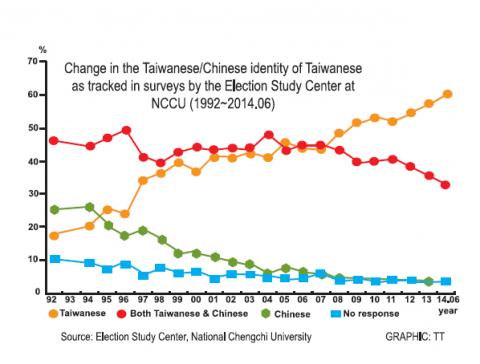A poll by National Chengchi University’s Election Study Center showed that a record-high 23.8 percent of respondents support Taiwanese independence, while a record-low 32.7 percent regard themselves as both Chinese and Taiwanese.
Meanwhile, 60.4 percent said they are Taiwanese, according to the poll, released on Wednesday.
The data were collected from three separate polls titled “Taiwan Independence versus Unification with the Mainland Trend Distribution in Taiwan,” “Taiwanese/Chinese Identification Trend Distribution in Taiwan” and “Preferences Trend Distribution in Taiwan.”

The data showed that the percentage of people who regard themselves as Taiwanese is the highest since June 1992, and those identifying themselves as solely Chinese dropped to 3.5 percent.
The number of Taiwan independence supporters and those inclined toward an immediate declaration of independence was the highest since December 1994.
Support for the Chinese Nationalist Party (KMT) reached a new low at 23.5 percent, compared with the Democratic Progressive Party’s (DPP) 25.6 percent, the poll showed.
Most respondents who had once supported the KMT had taken a neutral stance and did not now support the DPP, the data showed.
Earlier this month, President Ma Ying-jeou (馬英九) criticized the Taiwan independence clause in the DPP’s party charter, saying it is neither possible nor necessary to pursue independence because the Republic of China has been a sovereign state since it was established in 1912.
Fu Jen Catholic University assistant professor Chou Wei-hang (周偉航) in a recent article posted on his blog claimed Ma has come to promote independence.
The Ma administration’s cross-strait policies attempting to draw Taiwanese away from ideas of independence and toward eventual unification with China have instead driven Taiwanese further from Beijing, Chou wrote in an article dated Saturday last week.
Chou’s article also said that some of the more neutral cross-strait policies were affected by Ma’s incompetence, adding that successful policies in Ma’s terms — including increasing the number of countries allowing Taiwanese access to visa waiver programs or visas upon arrival — emphasized the difference between Taiwan and China.
No matter how much Ma would detest it, his “place in history” will be as a promoter of Taiwanese independence, Chou’s article said.

NEXT GENERATION: The four plants in the Central Taiwan Science Park, designated Fab 25, would consist of four 1.4-nanometer wafer manufacturing plants, TSMC said Taiwan Semiconductor Manufacturing Co (TSMC, 台積電) plans to begin construction of four new plants later this year, with the aim to officially launch production of 2-nanometer semiconductor wafers by late 2028, Central Taiwan Science Park Bureau director-general Hsu Maw-shin (許茂新) said. Hsu made the announcement at an event on Friday evening celebrating the Central Taiwan Science Park’s 22nd anniversary. The second phase of the park’s expansion would commence with the initial construction of water detention ponds and other structures aimed at soil and water conservation, Hsu said. TSMC has officially leased the land, with the Central Taiwan Science Park having handed over the

AUKUS: The Australian Ambassador to the US said his country is working with the Pentagon and he is confident that submarine issues will be resolved Australian Ambassador to the US Kevin Rudd on Friday said that if Taiwan were to fall to China’s occupation, it would unleash China’s military capacities and capabilities more broadly. He also said his country is working with the Pentagon on the US Department of Defense’s review of the AUKUS submarine project and is confident that all issues raised will be resolved. Rudd, who served as Australian prime minister from 2007 to 2010 and for three months in 2013, made the remarks at the Aspen Security Forum in Colorado and stressed the longstanding US-Australia alliance and his close relationship with the US Undersecretary

‘WORLD WAR III’: Republican Representative Marjorie Taylor Greene said the aid would inflame tensions, but her amendment was rejected 421 votes against six The US House of Representatives on Friday passed the Department of Defense Appropriations Act for fiscal 2026, which includes US$500 million for Taiwan. The bill, which totals US$831.5 billion in discretionary spending, passed in a 221-209 vote. According to the bill, the funds for Taiwan would be administered by the US Defense Security Cooperation Agency and would remain available through Sept. 30, 2027, for the Taiwan Security Cooperation Initiative. The legislation authorizes the US Secretary of Defense, with the agreement of the US Secretary of State, to use the funds to assist Taiwan in procuring defense articles and services, and military training. Republican Representative

TAIWAN IS TAIWAN: US Representative Tom Tiffany said the amendment was not controversial, as ‘Taiwan is not — nor has it ever been — part of Communist China’ The US House of Representatives on Friday passed an amendment banning the US Department of Defense from creating, buying or displaying any map that shows Taiwan as part of the People’s Republic of China (PRC). The “Honest Maps” amendment was approved in a voice vote on Friday as part of the Department of Defense Appropriations Act for the 2026 fiscal year. The amendment prohibits using any funds from the act to create, buy or display maps that show Taiwan, Kinmen, Matsu, Penghu, Wuciou (烏坵), Green Island (綠島) or Orchid Island (Lanyu, 蘭嶼) as part of the PRC. The act includes US$831.5 billion in